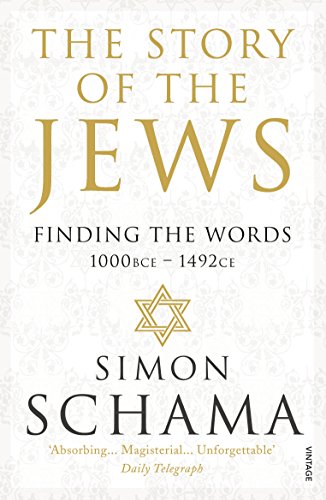Simon Schama, The Story of the Jews: Finding the Words (1000 BCE to 1492) (Vintage 2014)
Some decades ago, I borrowed a book called The History of the Jews from a friend, and was disappointed to find that it was little more than a smoothing out of the Biblical stories. As far as its author was concerned, it seemed, you didn’t need to go past the Hebrew Bible (the ‘Old Testament’) to get the history up to the beginning of the current era.
Simon Schama’s book is the one I was hoping for back then. The Hebrew Bible, he writes, is not primarily history, but
the imprint of the Jewish mind, the picture of its imagined origins and ancestry; it is the epic of the YHWH treaty-covenant with Israel, the single formless God moving through history, as well as the original treasure of its spiritual imagination.
(page 7)
Schama’s story doesn’t begin with Abraham leaving Ur, or even with Moses leading his people from Egypt. Schama isn’t confident that the exodus from Egypt even happened. It begins with the documented beginning of ordinary Jews, the earliest Jewish city that archaeologists have been able to reconstruct, on the island of Elephantine in Egypt, in the early 5th century BCE, hundreds of years after the Biblical account of the exodus. And although that city was a military outpost – Jewish soldiers employed by the Syrian empire – the book begins not with a battle or any grand scheme, but with a letter from a father to his soldier son.
Though the book’s title promises ‘The Story’, Schama insists from the beginning that there’s more than one story: the Biblical story and the archaeological story; Jerusalemite stories and stories of communities in exile; stories of those who integrate with their non-Jewish neighbours – Babylonian, Egyptian, Christian, Muslim – and of those who insist on rigorous separateness; stories of brilliant intellectual and spiritual achievement and stories of unimaginable horror (and this book ends in 1492).
I spent my first two decades in an intensely Catholic environment, so the account of Christianity’s transformation from a Jewish sect to a demonically anti-Jewish institution is particularly gripping to me. Cherie R Brown and Amy Leos-Urbel’s Anti-Semitism asserts that religion is not the cause of anti-semitism, but has been used as a tool to foment it. I think that makes sense, but reading how John Chrysostom, revered father of the church, preached vile slander and murderous injunctions against Jews (evidently thinking it was necessary because a lot of Christians in the 380s happily participated in Jewish festivals), tests the proposition. And my childhood image of St Francis preaching to the birds must now be accompanied by that of his Franciscan friars torturing and murdering men, women and children who refused to renounce Judaism, and many who had renounced it but continued to eat their customary food.
But the terrible history of humiliation and massacre is not the main story here. Again and again, Schama gives us stories of brilliant survival. The Talmud and the mishnah – tumultuous documents filled with wisdom, argument and disputation – grew in a state of exile. And before them, the Hebrew Bible itself was an extraordinary creation. A roll call of the people in this book who did great things would be very long: administrators, generals, poets – why haven’t I ever heard of Shmuel ibn Naghrela or Yehuda Halevi?
One small warning: I’m pretty knowledgable about Biblical stuff, have a smattering of mediaeval history, and some knowledge of current Judaic feasts. There were times when I found it hard to keep my bearings in the tumult of this story. So it may not a good place to start. If you don’t know who Moses is, or you’ve never heard of Purim, you might need something more straightforward, and move on to this when you’re ready.
Speaking with Paul Holdengräber at the 2019 Sydney Writers’ Festival, Simon Schama spoke of the heroism of the displaced. I don’t think the phrase occurs in this book, but it could have. His main subject at the SWF was the second volume of this story. You can hear that wonderfully entertaining conversation by clicking here, and my blog report on it here. He is now girding his loins for the third volume, which brings us through the twentieth century up to the present.


